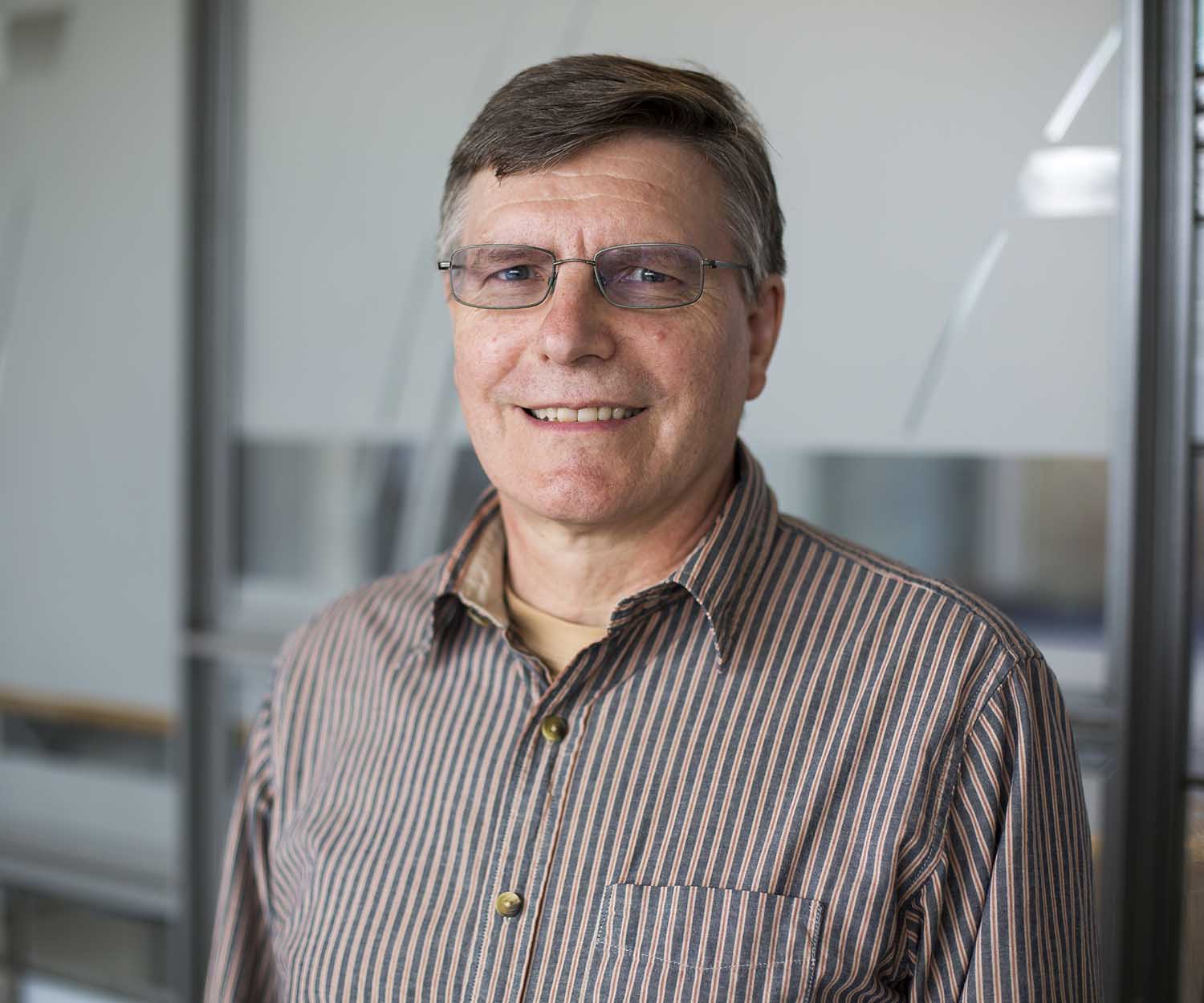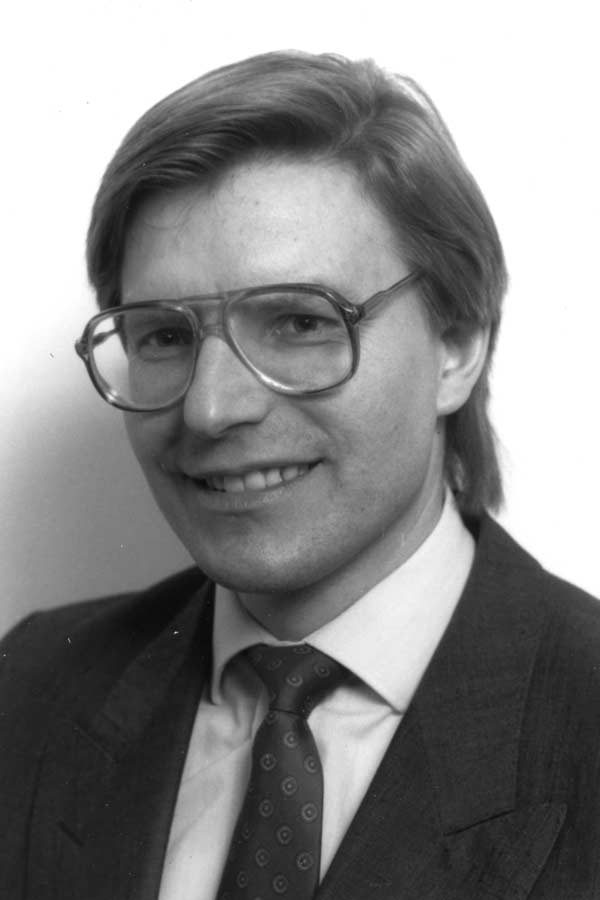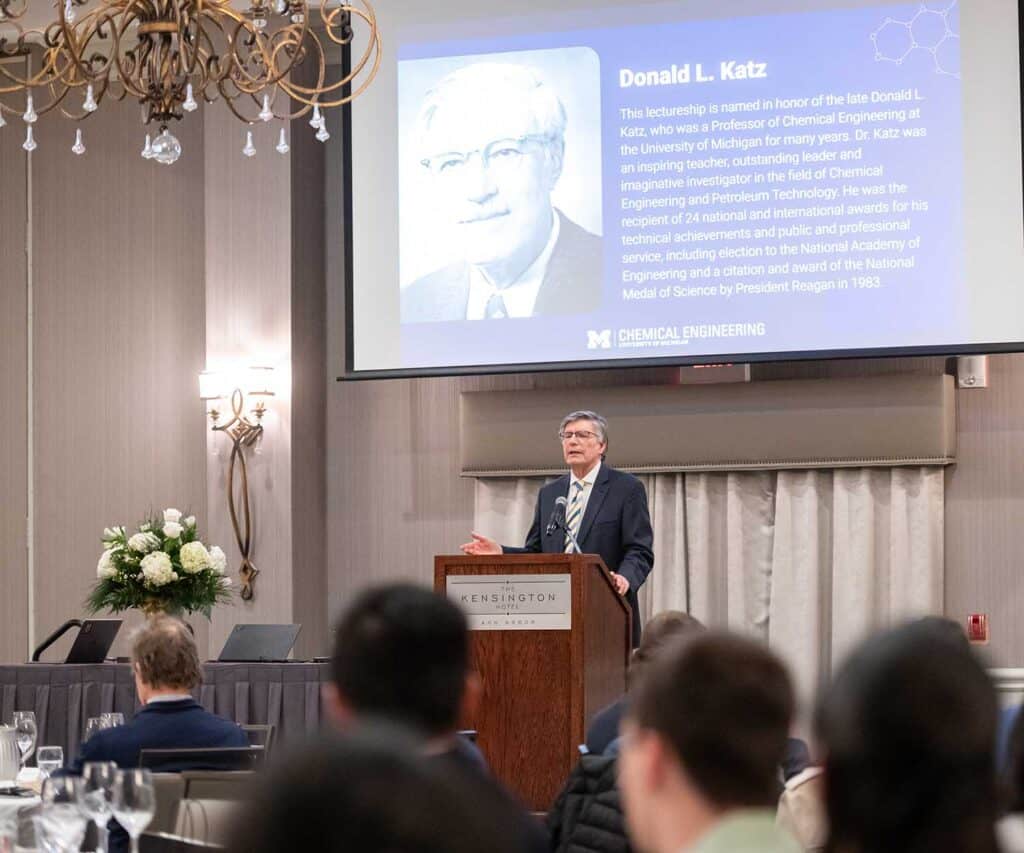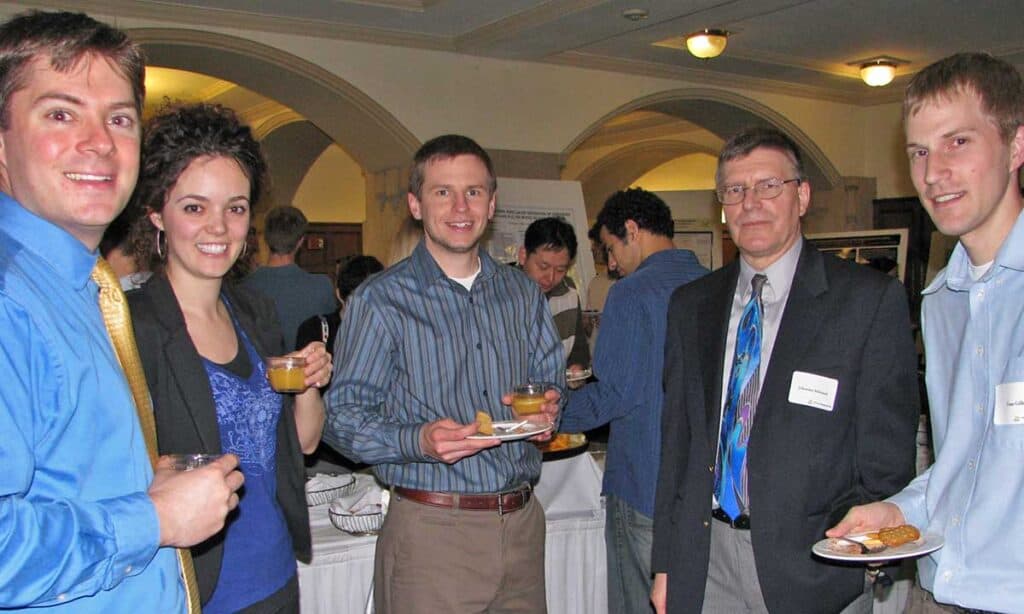
Celebrating the career of Johannes Schwank
Schwank has retired after a career spanning more than four decades at the University of Michigan.

Schwank has retired after a career spanning more than four decades at the University of Michigan.
Johannes Schwank, the James and Judith Street Professor of Chemical Engineering and a respected figure within the College of Engineering, has retired after a career spanning more than four decades at the University of Michigan. Schwank’s career from a postdoctoral scholar in the Department of Chemical Engineering to professor and prominent expert in physical chemistry and chemical engineering demonstrates his ongoing enthusiasm for research, mentorship and exploration.
“With his retirement from U-M, Johannes leaves an extraordinary legacy of excellence in scholarship, teaching, service and entrepreneurship,” said Sharon Glotzer, Anthony C. Lembke Department Chair of Chemical Engineering. “From his catalysis research benefiting the U.S. automotive industry to his innovative educational efforts to engineer technological solutions alongside the people of Gabon, Johannes has made critical contributions that perfectly embody the College of Engineering’s ‘People First Engineering’ credo.”
Schwank’s academic journey began at the University of Innsbruck, Austria, where he earned his chemistry diploma in 1975 and a PhD in physical chemistry in 1978. After completing his PhD, Schwank started as a Postdoctoral Scholar in the Department of Chemical Engineering at the University of Michigan. Shortly after in 1980, he became an assistant professor and his dedication and scholarly excellence quickly led to his promotion to associate professor in 1984, and to full professor in 1990.

During his tenure at the University of Michigan, Schwank made significant contributions to the institution and the field of chemical engineering. At Michigan, he held several important administrative leadership roles, serving as the chair of the Chemical Engineering department from 1990 to 1995, interim director of the Energy Institute from 2011 to 2012, and director of the Electron Microbeam Analysis Laboratory (EMAL) from 2013 to 2015. More recently, he led the Multidisciplinary Design Program as its director from 2021 to 2023.
“We could always count on Johannes to teach, serve, and pursue important research in a gracious and joyful way,” said Ronald Larson, George G. Brown Professor of Chemical Engineering and Alfred H. White Distinguished University Professor at the University of Michigan. “He played a key role in the recruitment of the brightest students for Michigan, contributing to the careers of faculty and many students while showing great creativity in applying research and engineering ideas to practical benefit.”
Schwank’s research has focused on fundamental and applied research problems in heterogeneous catalysis, sensors, and energy storage materials. A major theme of his research is the development of correlations between the surface structure of materials and their reactivity. His laboratories are equipped with comprehensive catalyst and materials characterization facilities.
In the area of heterogeneous catalysis, his work has centered on the correlations between the catalyst structure and composition and their catalytic functions in reactions of industrial importance. His investigations into principles of nucleation, clustering, and growth of small particles on support materials, particularly with bimetallic and oxide catalysts, have been groundbreaking. His research has also emphasized geometric and electronic interactions between catalyst components as a means to modify catalytic activity and selectivity.
His research efforts have largely focused on the characterization of supported catalysts using analytical and high-resolution electron microscopy. These microstructural characterization results have been contextualized with data from X-ray diffraction, atomic absorption, neutron activation analysis, gas chemisorption, and X-ray photoelectron spectroscopy. In-situ spectroscopic techniques such as Fourier-transform infrared spectroscopy have been employed to monitor adsorbed surface species under reaction conditions, which are then used to interpret kinetic results for hydrogen or oxygen transfer reactions obtained in flow reactors.
In the area of sensors, Schwank’s group has developed microelectronic gas sensors for a wide range of applications, from monitoring the purity of microelectronic processing gases to environmental sensing and automotive exhaust gas and diesel particulate sensing.
In energy storage, his research has focused on the synthesis and characterization of battery electrode materials, with a special emphasis on prototyping multivalent intercalation cathode materials.
Throughout his distinguished career, Schwank has been the recipient of numerous awards and honors. He is an AIChE fellow and received the prestigious Giuseppe Parravano Award, the U-M Chemical Engineering Departmental Excellence Award, and the College of Engineering’s Class of 1938E Distinguished Service Award. These accolades reflect his outstanding contributions to both academia and the field of chemical engineering.

Beyond research, Schwank has been a dedicated mentor to students at all levels, guiding 39 PhD candidates, 35 master’s students, 31 visiting graduate scholars, and 35 undergraduate students. Over his career, he taught ten different courses, fostering the next generation of chemical engineers with his expertise and passion.
“It was a joy working side by side with so many great faculty colleagues, staff members, and students who fostered a creative and supportive research and teaching environment,” Schwank said.” Looking back at the many years at the University of Michigan, the most important legacy is that so many talented students I had the privilege to mentor moved on to become influential leaders in academia and industry.
It was a joy working side by side with so many great faculty colleagues, staff members, and students who fostered a creative and supportive research and teaching environment. Looking back at the many years at the University of Michigan, the most important legacy is that so many talented students I had the privilege to mentor moved on to become influential leaders in academia and industry.
Johannes SchwankJames and Judith Street Professor Emeritus of Chemical Engineering and professor emeritus of chemical engineering
When current Professor of Chemical Engineering Robert Ziff joined the department in 1982, one of the first courses he instructed was ChE 230, the introductory thermodynamics and stoichiometry course with Schwank.
“I still remember the well organized lectures Johannes gave — I still try to emulate that. I served on many of Johannes’s students’ thesis committees, including that of Levi Thompson who is now Dean of Engineering at Delaware,” Ziff said.
Schwank’s previous mentees also include current Professor of Chemical Engineering, Eranda Nikolla. Nikolla received her PhD from the department in 2009, co-advised by Schwank and Suljo Linic. She returned to Michigan Chemical Engineering as a professor in 2022.
“It was truly a pleasure to have Johannes as my PhD advisor. His unwavering support, wisdom, and encouragement have been invaluable throughout my academic journey,” Nikolla said.

Throughout his career as a leading innovator and scholar, Schwank co-authored 236 refereed scientific publications and 25 patents. His mentorship has nurtured the careers of many who have gone on to make their own significant contributions to the fields of catalysis and materials science.
“Johannes is the most understanding, kind, and supportive advisor one could ask for,” said Carissa Yim, a current PhD student in the Schwank Lab. “He is generous with his time – joining me in the lab to solve issues together, or welcoming me and my lab mates to his home for warm gatherings filled with lively music, dancing, laughter, and food. It is truly a privilege to work with Johannes and to be inspired by the colorful way he envisions and speaks about the future through science and innovation.”
In recognition of his extraordinary career and lasting legacy, the Regents of the University of Michigan have honored Schwank with the title of James and Judith Street Professor Emeritus of Chemical Engineering and professor emeritus of chemical engineering.
“While his sustained level of involvement in our department, as well as his wisdom and insights, will be greatly missed by all of us, we wish Johannes and his family the very best in his retirement,” said Sharon Glotzer, Anthony C. Lembke Department Chair of Chemical Engineering.